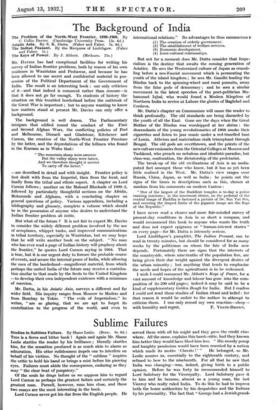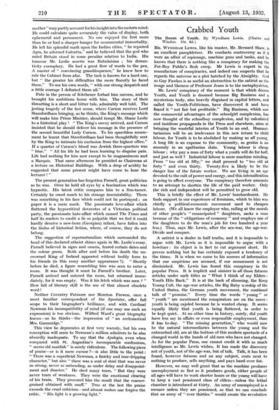Sublime Failures
Studies in Sublime Failure. By Shane Leslie. (Bann. 8s. 6d.) Tins is a fierce and bitter book 1 Again and again Mr. Shane Leslie startles the reader by his brilliance ; literally startles him, for the sensation produced is as much akin to alarm as admiration. His utter ruthlessness impels one to interfere on behalf of his victims. No thought of the " sublime " inspires the critic to hold his hand or brings a mist before his piercing eyes. Failures must abide the consequence, enduring as they may " the clear heat of purgatory."
Of the souls he drags before us we suppose him to regard Lord Curzon as perhaps the greatest failure and certainly the greatest man. Parnell, however, runs him close, and these two essays are the most interesting in the book. Lord Curzon never got his due from the English people. He
served them with all his might and they gave the credit else- where. All the same, explains this harsh critic, had they known him better they would have liked him less. " His moody pomp and haughty pessimism would have been resented by a nation which made its motto ' Cheerio 1 ' " He belonged, so Mr. Leslie assures us, essentially to the eighteenth century, and refused to bow to the nineteenth. For all that he saw that India was changing—was, indeed, giving birth to a public opinion. Before he was forty he recommended himself to Lord Salisbury for the Viceroyalty.. Lord Salisbury gave it to him and he became, almost as a young man, the last Viceroy who really ruled India. To do this he had to impress both the home authorities by his despatches and the Indians by his personality. The fact that " George had a Jewish grand-
mother "may partly account for his insight into the eastenrmind. He could calculate quite accurately the value of display, both ephemeral and permanent. No one enjoyed the first more than he or had a sharper hunger for monumental immortality. He left his splendid mark upon the Indian cities, " he repaired Agra, he adorned Calcutta," and he believed that the god who ruled Britain stood in some peculiar relation to India. His humour Mr. Leslie asserts was Rabelaisian ; his domes- ticity exemplary. He had a great flow of words to the pen. A master of " convincing grandiloquence," he knew how to rule the Cabinet from afar. The task is known for a hard one, but " the greater his difficulties the more fluently he faced them." To use his own words, " with one strong despatch and a-little courage I defeated them all."
Fate in the person of Kitchener forbad him success, and he brought his ambitions home with him. The story of their thwarting is a short and bitter tale, admirably well told. The jesting tragedy of the last scene, where Curzon receives Lord Stamfordham bringing, as he thinks, the King's message which will make him Prime Minister, should tempt Mr. Shane Leslie to a historical play 1 " The King's envoy arrived, and Curzon insisted that he should deliver his message in the presence of the second beautiful Lady Curzon. To his speechless amaze- ment he learnt that Stamfordham had been thoughtfully sent by the King to intimate his exclusion from the highest office." If a quarter of Curzon's blood was Jewish three-quarters was " blue." " All his life he had been learning to disguise pain. Life had nothing for him now except to be magnanimous and a Marquis. That same afternoon he presided as Chairman at a lecture on Historical Buildings. With a drop of acidity he suggested that some present might have come to hear the lecturer ! "
The present generation has forgotten Parnell, great politician as he was. Once he held all eyes by a fascination which was hypnotic. His latest critic compares him to a lion-tamer. Certainly he owed much to his strange inscrutability. There was something in his face which could not be portrayed ; on paper it is a mere mask. The passionate love-affair which fluttered the hypocritical dovecotes of a Victorian political party, the passionate hate-affair which caused The Times and half its readers to credit a lie so palpable that we feel it could hardly deceive a new-born (Georgian) infant, have fallen into the limbo of historical fiction, where, of course, they do not belong.
The suggestion of supernaturalism which surrounded the head of this declared atheist shines again in Mr. Leslie's essay. Parnell believed in signs and omens, feared certain dates and the colour green. Both after and before his death the un- crowned King of Ireland appeared without bodily form to his friends (is this essay another appearance ?). " Shortly before he died, a figure resembling him was seen to enter a room. It was thought it must be Parnell's brother. Later, Parnell arrived and entered the room, but returned imme- diately, for it was empty. Was it his fetch which was seen ? " How full of literary skill is the use of that almost obsolete word I Neither Coventry Patmore nor Moreton Frewen, once a most familiar correspondent of the Spectator, offer full scope to their biographer's brilliance, and with Cardinal Newman his incompatibility of mind (if one may use such an expression) is too obvious. Wilfred Ward's great biography leaves—so he thinks—the impression of " an ecclesiastical Mrs. Gununidge."
This view he deprecates at first very warmly, but his own conception will seem to Newman's million admirers to be also absurdly inadequate. To say that the Apologia, even when compared with St. Augustine's incomparable confessions, " seems old maidish " is surely ridiculous. The following piece of praise—or is it mere excuse ?—is also little to the point : " There was a superficial Newman, a finicky and tear-dripping character," but also " there was a soul of steel that was never so strong, never so unbending, as under delay and disappoint- ment and disaster." He shed many tears, " But they were never tears of weakness. They were the emotional clearing of his brain. They procured him the result that the coarser- grained obtained with snuff." True at the last the praise exceeds the cruel criticism—and almost makes one forgive the critic. "His light is a growing light."































 Previous page
Previous page